Pillaiyar Kulam Building Expansion Update
Tirukural – Chapter 99
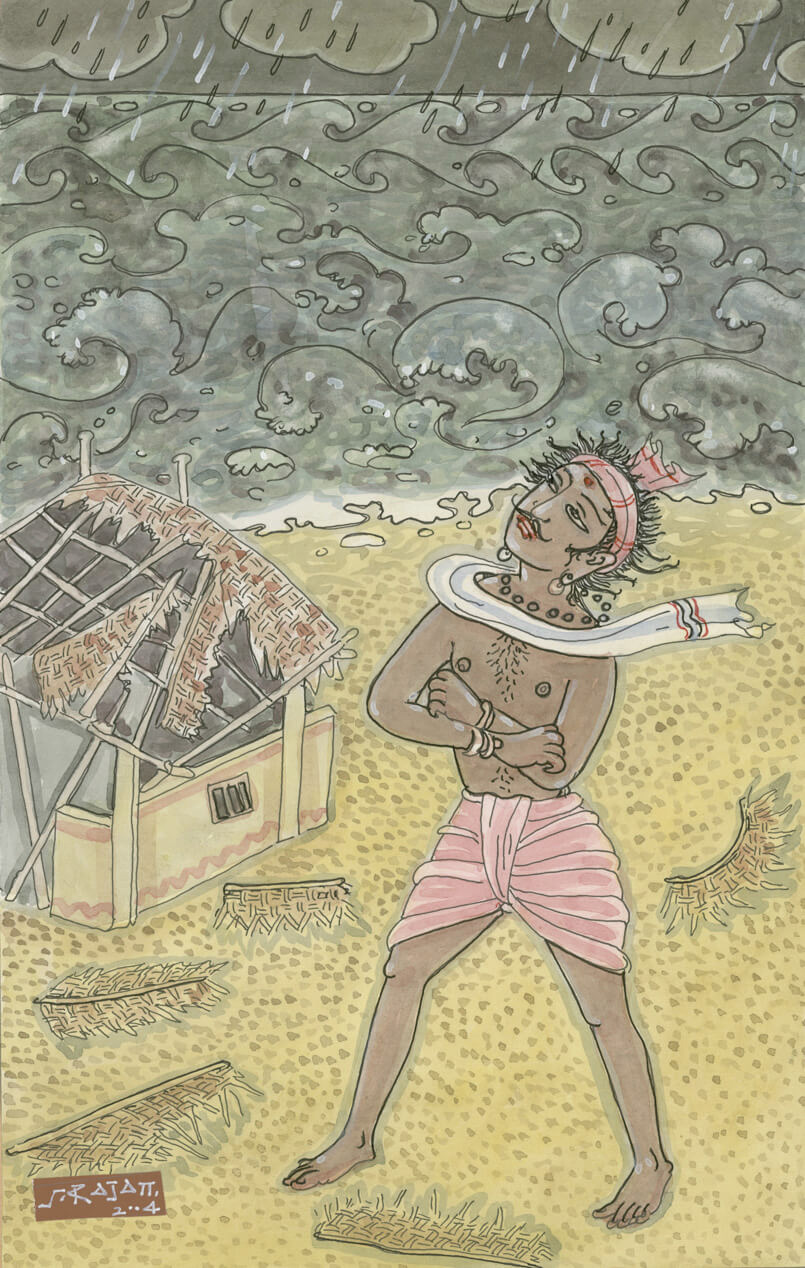
Chapter 99: Perfect Goodness

Verse 989
A massive storm has struck the seashore causing waves and winds that have destroyed a man's home. Even amid this tragedy and loss, he stands firmly on the ground, his legs apart as he faces the storm with profound courage and stoic acceptance.
You can access the entire text, in Tamil and English here:
Weaver's Wisdom
Verse 981
It is said that all good things are natural to those
who know their duty and walk the path of perfect goodness.
Verse 982
Perfect men hold as good their own good character.
They count no other goodness so genuinely good.
Verse 983
Love, modesty, propriety, a kindly eye and truthfulness--
these are the five pillars on which perfect goodness rests.
Verse 984
Penance is the goodness that refrains utterly from killing.
Perfection is the goodness that refuses to utter others' faults.
Verse 985
Humility is the strength of the strong
and the instrument the wise use to reform their foes.
Verse 986
The touchstone of perfect character is
accepting with dignity defeat from one's inferiors.
Verse 987
Of what gain is perfect goodness if it does not do good to all,
even to those who have done painful things to others?
Verse 988
Deprived of all else, one remains undisgraced
if still endowed with strength of character.
Verse 989
Destiny's last days may surge with oceanic change,
yet perfectly good men remain, like the shore, unchanged.
Verse 990
Should the perfect virtue of perfect men ever diminish,
this mighty Earth would bear our burdensome weight no more.
Tirukural – Chapter 98
Chapter 98: Greatness
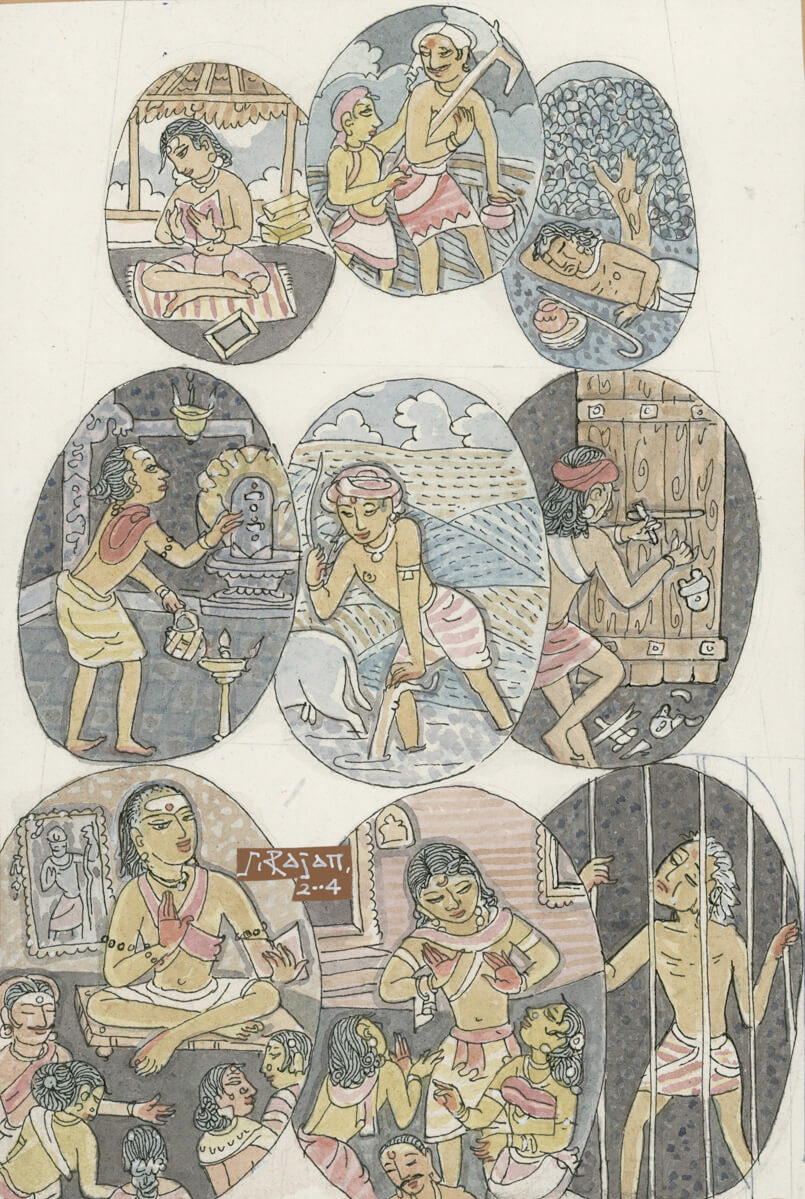
Verse 972
Here we see nine vignettes of life experiences which determine the greatness or the meanest of a man. From top to bottom there is a student studying diligently, a man working hard in the field, a lazy fellow, a priest who is worshiping in the temple, a farmer tilling his rice fields, a thief breaking into another person’s home, scholar teaching his students, a father mediating an argument with his neighbors and, finally, a criminal who has been imprisoned.
You can access the entire text, in Tamil and English here:
Weaver's Wisdom
Verse 971
The aspiration for glorious achievement is the light of life.
Disgrace is the dark thought that says, "I can live without it."
Verse 972
All men who live are alike at birth.
Diverse actions define their distinction and distinctiveness.
Verse 973
Lowly men are never high, even when elevated.
High souls are never low, even when downtrodden.
Verse 974
Like chastity in a woman, greatness is guarded
by being true to one's own self.
Verse 975
A man possessing greatness possesses the power
to effectively perform uncommonly difficult deeds.
Verse 976
"We will befriend great men and become like them."
Such thoughts seldom intrude upon small minds.
Verse 977
When small-minded men do achieve some distinction,
it only serves to augment their arrogance.
Verse 978
Greatness is always humbly self-effacing,
while pettiness adorns itself with words of praise.
Verse 979
Greatness abides in the absence of arrogance.
Smallness proudly parades its fulsome haughtiness.
Verse 980
Greatness conceals by silence the weaknesses of others.
Pettiness promptly proclaims such things to all.
Tirukural – Chapter 97
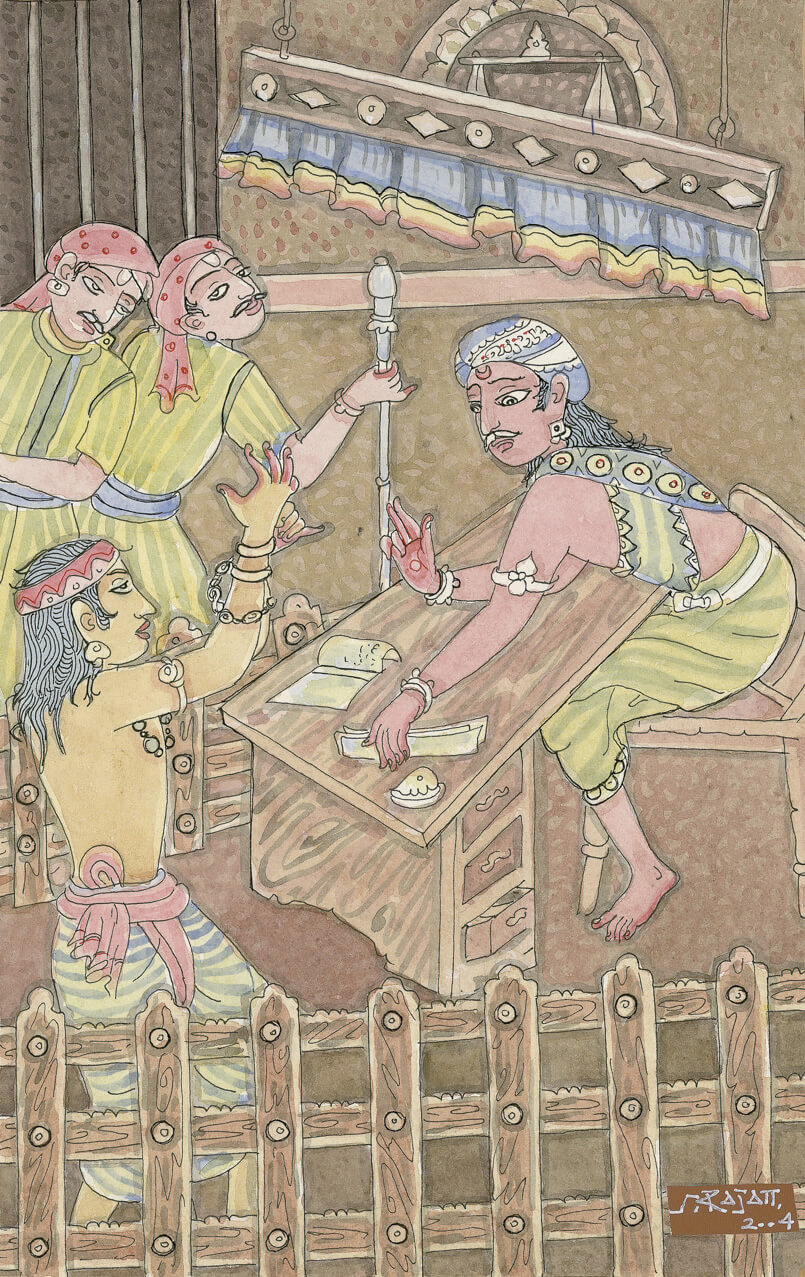
Chapter 97: Honor

Verse 970
A man has been brought to a judge in a secure courthouse. The judge finds him guilty and offers him two choices of punishment, shown by the two fingers he holds up. The accused does not see honor in either of those choices, and he holds up a third finger on his hand to indicate he is choosing death instead of dishonoring his innocence.
You can access the entire text, in Tamil and English here:
Weaver's Wisdom
Verse 961
Shun any actions that will diminish honor,
even if they are vital for the preservation of life.
Verse 962
Those who honorably pursue glory never act ingloriously,
even if glorious fame is to be gained.
Verse 963
Cultivate modesty in the midst of good fortune,
but in times of adversity preserve your dignity.
Verse 964
Honorable men fallen from high status
are like useless hair fallen from the head.
Verse 965
Unworthy acts, though mustard-seed small, will bring down
a man, though he towers like a mountain.
Verse 966
It offers neither Earth's renown nor Heaven's refuge,
so why do men run after and stand by those who revile them?
Verse 967
Better to die right where you stand, the saying goes,
than to live running after those who despise you.
Verse 968
Will any medicine preserve the body of the high-born man
whose honor has already perished?
Verse 969
Shorn of its hair, the yak will refuse to live.
Such men do exist who prefer death to the loss of honor.
Verse 970
The world will extol and exalt honorable men
who exult in death rather than endure dishonor.
Tirukural – Chapter 96
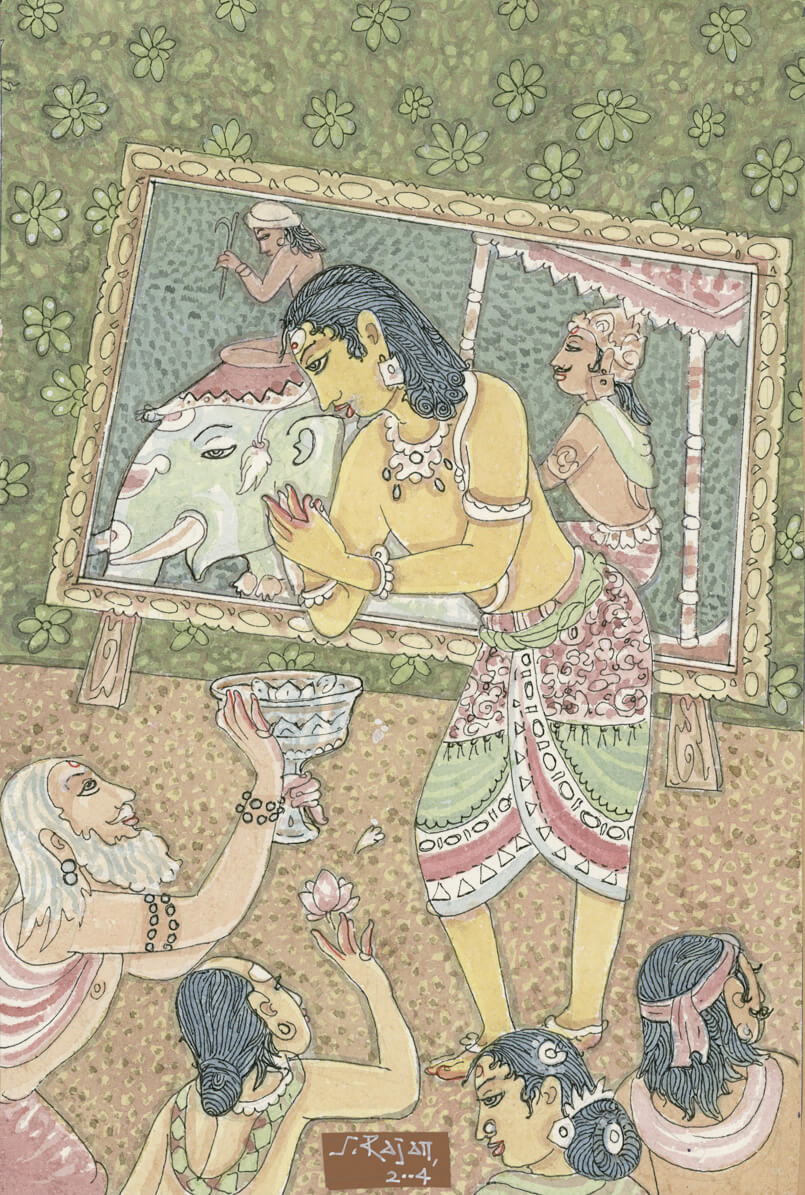
Appendix
The Qualities of People
Chapter 96: Nobility

Verse 960
An accomplished artist, whose masterpiece is behind him, has just received a trophy and monetary awards for his achievement. He is enjoying the accolades of the crowd who have come to the event. He shows his nobility by pressing his hands together and honoring all present in true humility.
You can access the entire text, in Tamil and English here:
Weaver's Wisdom
Verse 951
An innate sense of right and shying away from wrong
are found together only in the nobly born.
Verse 952
Men of noble birth will never fall away from these three:
correct conduct, truthfulness and modesty.
Verse 953
Four traits define the true gentleman: a smiling face,
a generous hand, a courteous demeanor and kindly words.
Verse 954
Though millions upon millions could be gained by it,
men nobly born would never commit a demeaning deed.
Verse 955
Though their means of charitableness may be cut off,
venerable families will never be severed from propriety.
Verse 956
Those committed to their family's flawless fame
dare not commit deceitful, dishonorable deeds.
Verse 957
In high-born men, blemishes are clearly seen,
just as the moon's elevation makes it more visible.
Verse 958
When a man with good background lacks loving affection,
doubts arise whether he arose from that family.
Verse 959
The nature of a soil is known by the seedlings it sprouts.
The nature of a man's family is known by the words he speaks.
Verse 960
Those desiring greatness must desire modesty. Those seeking
their family's honor must seek to be respectful to all.
Tirukural – Chapter 95
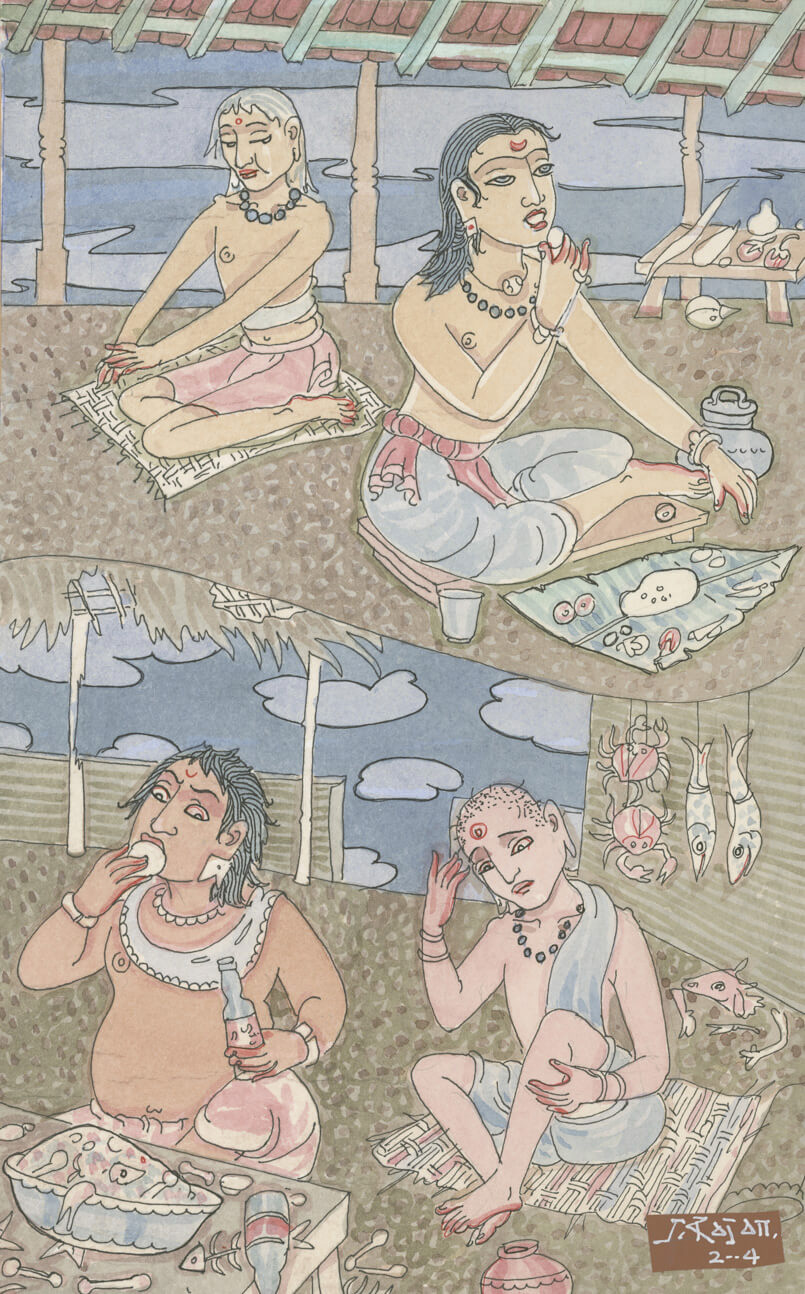
Chapter 95: Medicine

Verse 945
Above, a householder is taking his lunch on a banana leaf. He is eating wholesome rice and curry with lots of fresh vegetables. Behind him a family elder who has followed this diet his whole life is smiling and physically fit. Below, a less controlled man is eating and drinking over abundantly. His diet is alcohol, fish and meat. Nearby, an elder in his household, who is following this diet, is suffering from many ailments.
You can access the entire text, in Tamil and English here:
Weaver's Wisdom
Verse 941
Disease is but deficiency or excess of three life forces,
defined by writers of scientific texts as air, fire and water.
Verse 942
The body requires no medicine if you eat
only after the food you have already eaten is digested.
Verse 943
Once digestion is complete, eat with moderation;
that is the way to prolong the life of the body.
Verse 944
Assured the last meal has digested and sensing a keen appetite,
savor only foods that are fully agreeable.
Verse 945
Life remains unharmed when one eats with restraint,
refraining from foods that have proven disagreeable.
Verse 946
The pleasures of health abide in the man who eats moderately.
The pains of disease dwell with him who eats excessively.
Verse 947
The thoughtless glutton who gorges himself beyond the limits
of his digestive fires will be consumed by limitless ills.
Verse 948
Diagnose the illness, trace its cause,
seek the appropriate remedy and apply it skillfully.
Verse 949
An accomplished doctor prescribes a remedy after considering
the patient's nature, the disease's nature and the time of year.
Verse 950
Medicine consists of a patient, a physician, a prescription
and a nurse--each of these having four parts.
Tirukural – Chapter 94
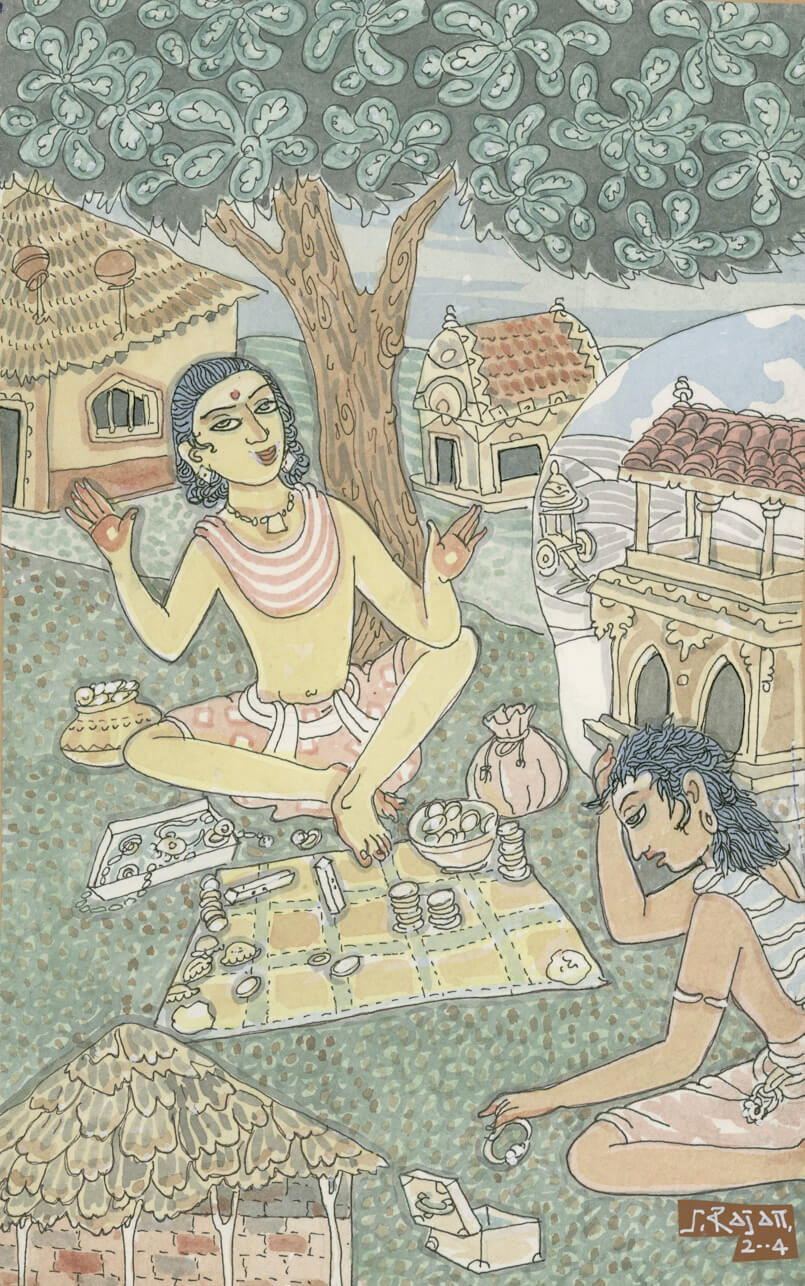
Chapter 94: Gambling

Verse 940
Under a tree two men have been gambling for hours. The winner, with his hands up, is celebrating and mocking the loser. The loser holds his head in disbelief that he has lost so much. However, he brings a bangle out of a treasure chest and offers to risk it along with his home and vehicles on the next roll of the dice.
You can access the entire text, in Tamil and English here:
Weaver's Wisdom
Verse 931
Do not take to gambling, even if you can win,
for your wins will be like the baited hooks that fish swallow.
Verse 932
To win once, a gambler loses a hundred times.
What a way to procure happiness and prosperity!
Verse 933
Incessantly calling bets on rolling dice causes
a man's rich reserves and potential revenues to run elsewhere.
Verse 934
Gambling brings on many miseries and erodes one's good name.
Nothing else ends in such wretched poverty.
Verse 935
Desiring to win everything, those who love the dice,
the gambling hall and their lucky hand lose it all.
Verse 936
Gambling is Misfortune's other name. Fools ensnared by her
will suffer an empty stomach and distressing sorrows.
Verse 937
Spending time in the gambling hall squanders
ancestral wealth and wastes personal worth.
Verse 938
Gambling will consume a man's wealth and corrupt his honesty.
It will curtail his benevolence and increase his torment.
Verse 939
Those who take to gambling's fickle gain forfeit these five:
raiments, riches, rations, renown and erudition.
Verse 940
The gambler's passion increases with the losses incurred.
Even so does the soul's craving for life grow with the griefs suffered.
Tirukural – Chapter 93
Chapter 93: Avoidance of Drunkenness
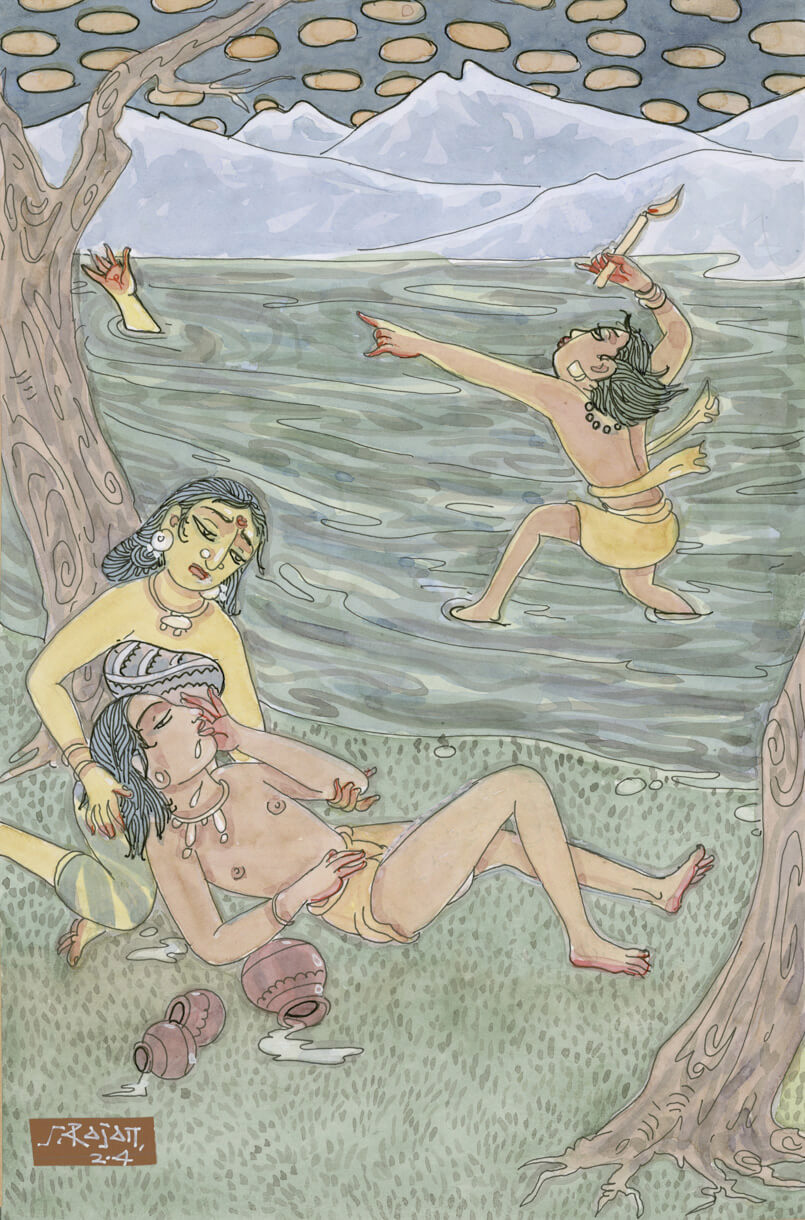
Verse 929
A grieving mother consoles her son who has drunk himself into a stupor. She is urging him, unsuccessfully, not to drink anymore. Meanwhile, her other son, being a bit foolish, rushes to save a drowning man, thinking that he can go underwater with a candle and it will illumine the man's body.
You can access the entire text, in Tamil and English here:
Weaver's Wisdom
Verse 921
Those who crave intoxicating drink each day
will never be feared and never find fame.
Verse 922
Do not drink liquor. If some wish to, let it be those
who have no wish for the esteem of exemplary men.
Verse 923
The sight of a drunken man's revelry is unbearable
even to his own mother. How, then, must it appear to the wise?
Verse 924
The virtuous damsel called Decency will turn her back
on men who indulge in the vile vice called drunkenness.
Verse 925
Spending one's wealth to purchase self-oblivion
results from being oblivious to proper conduct.
Verse 926
Those who always sleep are akin to the dead.
Those who constantly drink are like men who take poison.
Verse 927
The drooping eyes of those who secretly drink betray that secret,
evoking their neighbor's relentless ridicule.
Verse 928
Stop denying, "I never drink," for next time you drink,
your mind's hidden deception will be betrayed then and there.
Verse 929
One may as well carry a candle under water to search for
a drowned man as use reason to sober a drunk drowned in drink.
Verse 930
Why can't the drunkard who, when sober, sees another's drunken
stupor realize the degrading shame of his own drunkenness?
Yoga’s Forgotten Foundation – The Audio Book!
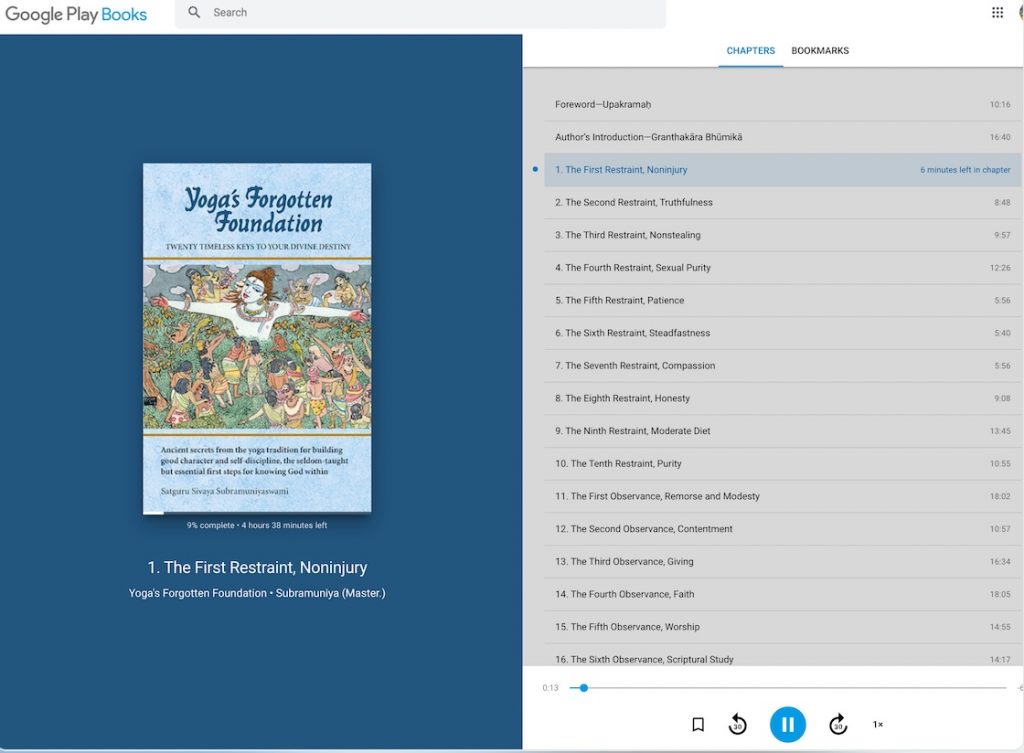
Aum Namah Sivaya,
Please enjoy this audio book of Yoga's Forgotten Foundation, which details the ten restrains and ten observances of Hindu religious life. The book is free. It was created in just a few hours using Google Play's automated book transcription software, which has been improving rapidly in recent years. Let us know what you think!
Get it here
Woman Sage Chellachiamma

Today we bring you a story from The Guru Chronicles. It is part of a chapter on a mystical Tamil woman who was close to Yogaswami and for a time the primary spiritual preceptor in Jaffna, Sri Lanka.
One of Yogaswami's contemporaries was a saint named Chellachi Ammaiyar, whose home had become like an ashram. She was born in 1863, the same year Swami Vivekananda entered this world. Devout from early childhood, she worshiped at the temple as often as her parents would take her and learned the Puranic stories and the hymns of the Tamil saints. She lived in Chunnakam, a farming and market village about twelve kilometers outside Jaffna Town.
From the day her husband was cremated, her spiritual life was her only life. She followed a strict discipline for several years of sitting in meditation every time the village temple bell rang at puja time--reveling in the shakti as it drew her deep into Siva consciousness. One day her inner voice told her to stop doing that and to sing certain songs to Lord Ganesha. After singing them for several months, she received the message that she should now perform a daily puja to Siva, using a Lingam to represent the Supreme Absolute.
In time another inner message came: that her body would keep clean of itself, and she should not take a full bath again. She was not to go to the well and pour water over herself as she had done her whole life. She obeyed, never bathing again. Her gray hair, which knew no comb from that day, grew long and tangled. People who came to see her still remember the matted locks. Otherwise, she was perfectly clean and had a pleasant, radiant appearance.
At one point, directions came that she should prepare to go into the deepest samadhi, God Realization, direct encounter with the Divine. Instructions came to tell all members of the household that she would be sitting in meditation in the shrine room for a long time and should not be disturbed for any reason. She carefully explained this to each one individually. Then, entering her shrine room, Chellachi sat in perfect stillness, controlling her breathing for several days. Sometimes she would breathe very slowly and quietly; at other times her breathing would stop altogether. For several days she sat in that profound state.
After three days of observing that Chellachi seemed to be not breathing at all, a relative grew concerned that she had died. For hours and hours--concerned that the body, if dead, be properly taken care of so that no disembodied entity could take it over--she watched for any sign of life and saw none. Finally, she cautiously approached Chellachi Ammaiyar, opened her mouth and pulled out her tongue to see if it exhibited the tell-tale signs of death. It was a fateful mistake and a startling intrusion for the Siva-immersed saint. Without warning, her samadhi was shattered and awareness was brought crashing back into body consciousness. Several days passed, as her nerve system reeled from the horrendous shock.
The disturbance of that unusually deep state caused a severe reaction that lasted for the rest of her life. She became so sensitive to light that she could not even stand direct exposure to moonlight. The darkened veranda became her favorite place. If anyone approached who was not pure minded or had selfish motives, her body would heat up to the point of causing her pain. Close devotees were nervously cautious about whom they allowed in her presence.
Her ashram-like home radiated peace and stability. Yogaswami visited there frequently beginning around 1914. She was his elder by nine years, and he regarded her as a spiritual mentor. She addressed him as Thamby, meaning younger brother. Once she told a devotee that only by virtue of that shocking experience of having her samadhi interrupted did Yogaswami come to take her farther within than she could have gone without his grace.
Chellachi Ammaiyar was a gifted teacher. She spoke from her own experience about how important it is to follow the dictates of the divine voice within oneself and the divine laws that were perceived by the rishis. When people came to her who were having problems, she would always look to see where they were stepping outside the flow of life prescribed by the scriptures. She said that is how the ego is born and gains its strength. When you begin to twist what you perceive, what you know from within yourself is right, when you step off the path of virtue, then you build up the "I," and that "I" separates you from all of life and from that which is the very spring of life.
She spoke in a quiet, thin voice, as though she were too sensitive to hear herself speaking. But it had a piercing resonance, and everyone took note of all she said.
If you live life for its own sake, you have missed the purpose of living, for life is to be lived for the glory of God, and only God must be the center of life. Being obedient to the voice of the guru within yourself is more important than life itself.
Yogaswami often echoed those sagely words. "The spiritual path is a narrow bridge of hair over a river of fire!" was one of her well-known adages. It cautioned of the tenuous nature of the path and the abounding distractions that deter seekers. She taught that God will come in different forms, and that those forms change as you understand Him, love Him and follow His directions. "You will see more and more clearly, and finally you will be so pure that you will be only That."
During the first decade of his association with Chellachi Ammaiyar, Yogaswami was still hidden from public view. While in her company and in transcendental communication with Chellappaswami, he brought his teachings into articulation. Out of that all-important period of gestation, absorption and reflection came his emphasis on Sivathondu, "service to Siva," a potent term that embodied his compelling message to the Jaffna community and ultimately to all mankind: "Surrender totally in the pure act of service to God Siva. Be still. Know thy Self and serve the Lord who is All, in all." Two words would ultimately define his lofty public message: Sivathondu and Sivadhyana, service to and meditation upon Siva.
Toward the end of her life, Chellachi was so sensitive that she could only eat food that Yogaswami prepared. He would make the meal at his compound in the morning and carry it sixteen kilometers to her house each day. She was too weak to eat, so he fed her. Her earlier reactions to visitors grew far more intense, so much so that the inflammation caused by the presence of an impure visitor rendered her unable to breathe. Strict screening of visitors, once a cautionary rule, became an urgent necessity.
On January 27, 1929, Chellachi Ammaiyar attained mahasamadhi. Her family and some devotees planned to build a shrine and bury her body there, as is often done for enlightened beings, rather than cremate it. Yogaswami expressed his disapproval and emphatically said he would have nothing to do with it. The matter was settled when her son went to Yogaswami and agreed to cremate her body as Swami wished.
Her body was cremated on a sandalwood pyre. The arrangements were carried out by Yogaswami, Sir Vaithilingam Duraiswamy and Doctor Ramanathan. After Ammaiyar's passing, Swami, now age 57, was the sole spiritual refuge and guide for many of the Jaffna people. He remained the prominent spiritual light in that community for the next 35 years.
From Our Gurus' Teachings
Archives are now available through 2001. Light colored days have no posts. 1998-2001 coming later.
